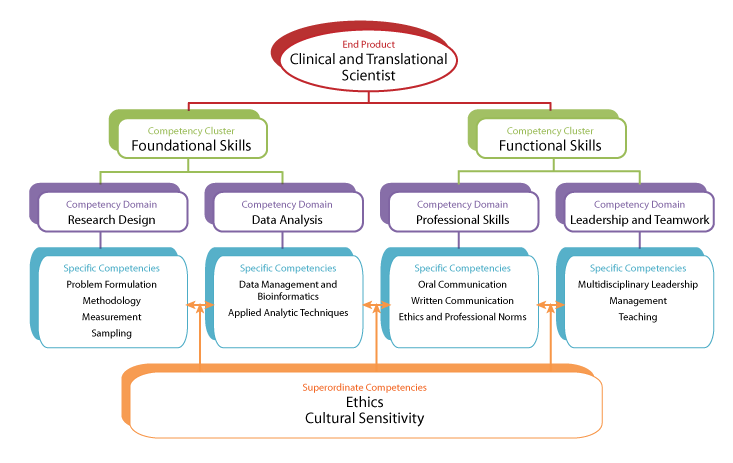Competency-Based Education
Competency-based education (CBE) places emphasis on the performance and demonstration of learning, as well as the integration of knowledge, skills, and attitudes. The competencies in a CBE framework are observable and measurable, and they specifically outline what learners should know and be able to do upon completion of study.
To develop a CBE framework and formally incorporate competencies into the curriculum of the clinical research degree programs, the ICRE applied for and received funding from the American Recovery and Reinvestment Act of 2009.
The ICRE subsequently developed a competency framework for the PhD Program in Clinical and Translational Science, for each of the tracks in the Master of Science Program in Clinical Research, and for the Certificate Program in Clinical Research. In each case, the aim of the framework was to ensure that ICRE graduates acquire and can demonstrate an integration of the skills, knowledge, and professionalism necessary to become effective and successful leaders in clinical research.
By mapping the competencies covered in the clinical research courses, the ICRE afforded its program leaders and course directors the opportunity to detect gaps in pedagogical offerings and to fill these gaps by creating new courses or by adding materials or sessions to current courses.
To facilitate the inclusion of competencies in course creation and revision, the ICRE developed a Web-based syllabus creator tool for course directors and faculty members to list the competencies addressed in each of their course sessions. The inclusion of competencies in syllabi prompts the faculty and students to become more aware of the intended results of courses and thereby helps them align their instructional and learning goals toward achieving competence.

The ICRE also compiled information about teaching techniques and assessment rubrics that can support CBE and made this information available to all faculty within the ICRE. The ICRE now encourages all course instructors to:
- Create tools that help students integrate and use what they have learned.
- Provide many performance opportunities in class.
- Offer multiple practical opportunities to acquire the same knowledge and practice the same skills.
- Include oral communication instruction and practice opportunities.
- Design opportunities for management and leadership instruction and practice opportunities.
The ICRE aims to integrate competencies into the culture of clinical research education. For this to happen, the competency feedback loop will be closed by the introduction of evaluations that formatively assess competence. The CBE work of the ICRE has drawn national interest. In 2010, the CBE group of the ICRE made a presentation and led a workshop at the Annual Meeting of the Association of Clinical Research Training and the Society for Clinical and Translational Science, and both of these activities were well received. In 2011, the group also gave presentations at the Clinical and Translational Research and Education Meeting sponsored jointly by the Association of Clinical Research Training, the Society for Clinical and Translational Science, and the American Federation for Medical Research; at the Annual Meeting of the Doris Duke Fellowship Program; and at the Annual Meeting of the Clinical and Translational Science Award TL1 Programs. Additionally, the CBE group has been involved at the national level in defining and mapping competencies in clinical and translational science education.


